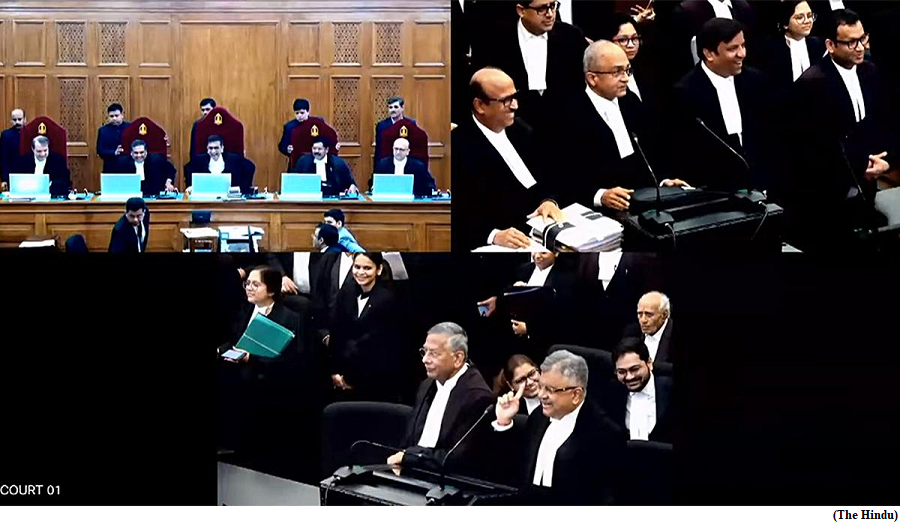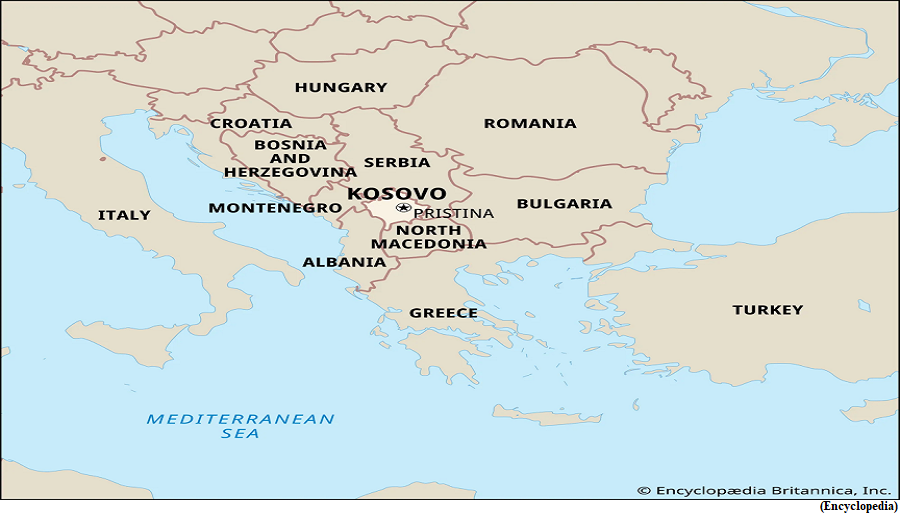SC rules electoral bonds scheme unconstitutional (GS Paper 2, Judiciary)

Why in news?
- A five-judge Bench of the Supreme Court (SC) led by Chief Justice of India (CJI) D Y Chandrachud has declared the electoral bond scheme as "unconstitutional".
This comes after a series of hearings surrounding the controversial government scheme launched in 2018 that allowed anonymous donations to political parties
Details:
- They held that the scheme, and preceding amendments made to the Representation of the People Act, the Companies Act, and the Income Tax Act, violated the voters’ right to information about political funding under Article 19(1)(a) of the Constitution.
- The absolute non-disclosure of the source of political funding through electoral bonds promoted corruption, and a culture of quid pro quo with the ruling party to introduce a policy change or for bagging a license.
- It said that the scheme and the amendments authorised unrestrained influence of corporates in the electoral process.
Petitioners:
- The electoral bond scheme, which was notified by the government on January 2, 2018, introduced money instruments through which companies and individuals in India can donate to political parties anonymously.
- The petitioners in the case were the Association for Democratic Reforms, represented by advocate Prashant Bhushan, and the Communist Party of India-Marxist (CPI-M), represented by advocate Shadan Farasat. The government was represented by Attorney General R. Venkataramani and Solicitor General Tushar Mehta.
Money-politics nexus:
- The judgment belled the cat on the deep nexus between money and politics, saying that “contributions made by companies are purely business transactions made with the intent of securing benefits in return”.
- The scheme allowed the inflow of “huge contributions” by multinational corporations with major business stakes in the country, overawing or even concealing the relatively small financial contributions of people who believe in the ideologies of a political party without expecting any substantial favours in return.
- The scheme and the amendments promoted “economic inequality” by giving corporations with financial power an unsurpassable advantage over ordinary citizens in the electoral process and political engagement.
- This is violative of the principle of free and fair elections and political equality captured in a value of ‘one person, one vote’.
Voters vs donors:
- The court agreed that the fundamental right to privacy covers a person’s political affiliation. However, it said, there should be a balance between informational privacy and the voters’ right to information.
- The court dismissed the Union government’s argument that the anonymity of political donors afforded by electoral bonds incentivised financial contributions through banking channels.
- The court rubbished the government’s claim that the scheme was meant to curb the injection of black money into the electoral process. It ruled that “curbing of black money” was not a reasonable restriction to the exercise of the voters’ fundamental right to information about political funding enshrined in Article 19(1)(a).
SC dismisses black money argument:
- The court rubbished the government’s claim that the scheme was meant to curb the injection of black money into the electoral process.
- It ruled that “curbing of black money” was not a reasonable restriction to the exercise of the voters’ fundamental right to information about political funding enshrined in Article 19(1)(a).
- The Chief Justice asked the Union government how the “absolute” non-disclosure of the sources of political funding introduced in the electoral bonds scheme could rationally help curb black money.
- Clause 7(4) of the scheme completely exempts information on the purchasers of electoral bonds. This information is never disclosed to the voters. The purpose of securing information about political funding cannot be fulfilled by absolute non-disclosure.
Double proportionality standards:
- Applying the “double proportionality standards”, the court said that the clause was unconstitutional as it did not balance the conflicting right to information of voters with contributors’ right to privacy regarding their political affiliations.
- The judgment noted that the entire electoral bonds scheme had hinged on the anonymity provided under Clause 7(4).
- Without this, the scheme was indistinguishable from other modes of financial contributions, including cheques, direct debit, and electronic transfers. Sans the clause, the scheme had to fall.
Amendments facilitated anonymity:
- The judgment referred to the way that amendments had been introduced in Section 29C of the Representation of People Act, Section 13A of the Income Tax Act, and Section 182 of the Companies Act via the Finance Act 2017, introduced as a Money Bill, to pave the way for blanket anonymity in financial contributions through the electoral bonds route notified in January 2018.
- Prior to the amendments, these provisions had maintained the needed balance between donors’ privacy and voters’ right to know.
Removed restrictions:
- The original Section 29C required political parties to publicly disclose contributions in excess of ₹20,000, received even through cheques and the electronic clearing system.
- The amendment, however, allowed a complete exemption for political parties to publish contributions received through electoral bonds.
- The amended Section 13A freed parties from the obligation of keeping a detailed record of contributions received through electoral bonds.
- Before the amendment, Section 182 had mandated that companies could donate only up to 7.5% of three years of their net aggregate income. The amendment lifted this cap and made room for unlimited and anonymous corporate donations to political parties.
Donations from loss-making firms:
- The pre-amendment provision had also banned government companies from making contributions to prevent them from entering the political fray.
- It had, moreover, classified loss-making companies and profit-making ones.
Why did Kosovo face delays in Schengen approval?
(GS Paper 2, International Relation)
Why in news?
- Kosovo recently secured visa-free access to the Schengen zone in Europe, world’s largest zone of free movement, becoming the last western Balkan non-European Union nation to be waived visa requirements.

Details:
- The zone is known after Schengen, the tiny Luxembourg village bordering France and Germany, where the agreement was signed in 1985 among five of the six EU founding members except Italy.
- Citizens of Kosovo can now enter the Schengen as tourists for 90 days within 180 days.
- Croatia, a European Union (EU) member since 2013, joined Schengen in 2023, while Romania and Bulgaria, EU members since 2007, will gain partial Schengen entry in March.
Why was Kosovo’s application kept pending for years?
- The case of Kosovo is egregious given that the European Commission had in 2018 cleared Pristina’s preparedness to tackle illegal migration and corruption, preconditions for the entry.
- The single biggest obstacle to the country’s Schengen visa waiver was strong opposition from several EU members, which do not recognise the 2008 unilateral declaration of independence by the breakaway state from Serbia.
- Kosovo has not been accorded legal statehood by the UN and denied recognition by Russia and China.
Is admission to Schengen mandatory for EU members?
- When the Schengen agreement took effect in 1995, only seven of the entire 15 member union at the time joined the passport-free area.
- Today, 23 of the 27 EU states are part of the passport-free zone, excluding Cyprus, Romania, Bulgaria and Ireland.
- But then, the Schengen area comprises 27 countries, including four non-EU members: Iceland, Liechtenstein, Switzerland and Norway.
How did the region cope with the COVID-19 crisis?
- Schengen had come under enormous strain following the Eurozone sovereign debt crisis during the last decade, the arrival of thousands of migrants from conflict zones in Africa and West Asia and the anti-immigrant-politics stoked by the continent’s far-right populist parties.
- The EU had even considered removal from Schengen, countries located on the bloc’s Mediterranean border, as individual states contemplated unilateral reinstatement of borders.
- While the frontier states such as Italy called for an effective system of burden sharing by the entire EU, the final destination states in western Europe, especially France and the U.K. resorted to questionable methods of offering incentives to prevent the arrival of refugees.
- The EU’s attempt to fashion a humane policy under the Dublin Regulation to protect asylum seekers, while maintaining the integrity of the Schengen, has itself come under severe scrutiny from human rights groups and the UN Refugee Agency.
What are the advantages of the EU’s border-free policy?
- For nationals of any country, the benefit is the freedom to travel with a single Schengen visa to other European nations within the borderless area.
- For EU states, the Visa-free borderless travel, alongside the single currency adopted by 20 EU countries, is the most visible symbol of European integration.
- The integrity of Schengen cannot be overstated for the success of the post-war European project.



